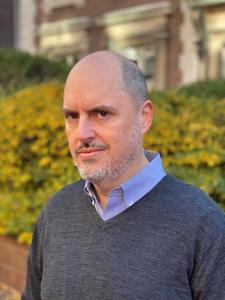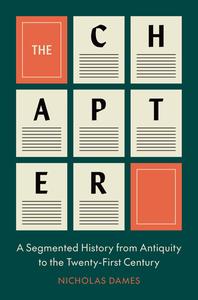 Nicholas Dames, a literary critic and scholar who lives in New York City, is a professor of English and comparative literature at Columbia University and co-editor-in-chief of Public Books, an online magazine of arts and ideas. He writes frequently on contemporary fiction and the state of the humanities for the Atlantic, the Nation, the New Yorker, n+1, and other venues. His third book, The Chapter: A Segmented History from Antiquity to the Twenty-First Century (Princeton University Press, November 7, 2023), traces the development of the chapter from an editorial and scribal practice of late antiquity and early Christianity to a compositional practice of the European novel.
Nicholas Dames, a literary critic and scholar who lives in New York City, is a professor of English and comparative literature at Columbia University and co-editor-in-chief of Public Books, an online magazine of arts and ideas. He writes frequently on contemporary fiction and the state of the humanities for the Atlantic, the Nation, the New Yorker, n+1, and other venues. His third book, The Chapter: A Segmented History from Antiquity to the Twenty-First Century (Princeton University Press, November 7, 2023), traces the development of the chapter from an editorial and scribal practice of late antiquity and early Christianity to a compositional practice of the European novel.
Handsell readers your book in 25 words or less:
My book explains why all kinds of books, but particularly novels, have chapters--and what those strange segmentations do for us, and to us.
On your nightstand now:
A stack of recent novels. On top, the British novelist Gwendoline Riley's My Phantoms. What Riley can do with dialogue has my complete attention. Next, tantalizingly, an advance copy of Lars Iyer's My Weil. I'm an admirer; Iyer's scabrous and justifiable comic misanthropy deserves to be much better known. And at the bottom, saved for a day when I can savor it, Amit Chaudhuri's Sojourn. Everything he writes is, for me, an event.
Favorite book when you were a child:
I was an early reader of adult mysteries. I had a childhood sprint through all of Agatha Christie, for instance. But my first real revelation was Ellen Raskin's 1978 middle-grade mystery The Westing Game, a brilliant quasi-modernist whodunit in which a reclusive millionaire leaves his fortune to one of the tenants of an apartment tower he'd owned--the one who can discover which of the others was his murderer. It's an ingenious puzzle, but it's also a subtle piece of social critique that taught me early lessons in what American life was--and was becoming. I reread it for an article I wrote on its 40th anniversary, and it holds up. It even feels prophetic.
Your top five authors:
As far as "top," that changes every day! But here are five for whom I feel a particular sympathy, a kind of recognition--authors whose frequency I tune into with ease. Three from the 19th century: Stendhal, Charlotte Brontë, Henry James. Two from the 20th: Penelope Fitzgerald, Muriel Spark.
Book you've faked reading:
Dostoevsky's Crime and Punishment, the summer I was 16, to impress a much better-read teenage crush of mine. My fakery wasn't detected. My karmic payback was to end up teaching it every year to undergraduates.
 Book you're an evangelist for:
Book you're an evangelist for:
Of late, it's been Jon McGregor's Reservoir 13, so much so that I had to squeeze it into my own book. The story of a young girl's disappearance from a small English village, it's a meditation on the many different orders and rhythms of time we find ourselves stretched between. It's a one-of-a-kind hybrid of the traditionalist and the experimental.
Book you've bought for the cover:
Every single one of the Fitzcarraldo Editions books I own, in their distinctive and uniform blue. They're one of the many pleasures of book shopping in the U.K. (although you can find some of them, occasionally, in the U.S.). Elegantly unadorned, standardized covers reflect a literary culture I want to live in. I admire the designer's art. But, really, I love nothing more than an austere restriction to the title and the author's name: take the French publisher Gallimard's famous Collection Blanche, for instance, or, in Germany, the little yellow volumes of Reclam's Universal Library series. Most contemporary fiction covers these days irritate me.
Book you hid from your parents:
Those copies of Raymond Chandler's Los Angeles noir mysteries--Farewell, My Lovely, say, or The Long Goodbye--that I was told I was too young for, but took down from the shelves anyway. Streetwise, city-poisoned adults seducing, betraying, and occasionally murdering each other: What else could a kid want?
Book that changed your life:
Gustave Flaubert's Madame Bovary. It was my first experience with the power of form in fiction. I remember pacing up and down my room in excitement over it. This, I thought, might be worth studying.
Favorite line from a book:
The final sentence of Henry James's The Wings of the Dove: "We shall never be again as we were!" In its immediate context, said by a clever and unscrupulous woman to her former lover, it's ambiguous, almost imponderable. But in a broader sense it's also remorselessly clear. It could be the last line to every novel, ever.
Five books you'll never part with:
Homer's Odyssey, a constant template for me. Jane Austen's Persuasion, another template. Evelyn Waugh's Decline and Fall, which never fails to cheer and console. Henry James's The Portrait of a Lady, still for me the paradigm of What A Novel Is. C.L.R. James's Beyond a Boundary, the greatest of books on sports and one of the greatest on acculturation, parts of which I've memorized through years of rereading.
Book you most want to read again for the first time:
Proust's In Search of Lost Time: I've a yearning, itself deeply Proustian, to recapture the experience of first reading it, at 20 years old, much of that marathon reading spent in a dorm single with the landline phone unplugged so nothing could interrupt me. Whenever I think of what theorists of reading call "immersion," that's the experience I summon up.
Your favorite chapter from a novel:
It's a fascinating peculiarity of chapters that one rarely remembers them as such! But I might as well go with the opinion of the Master--Henry James himself, who pointed it out in his preface to the novel: chapter 42 of The Portrait of a Lady, in which nothing (outwardly) happens. Read it and see.

